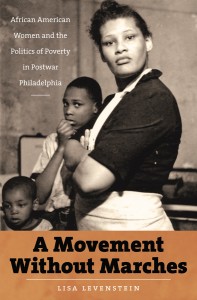WEDNESDAY, MARCH 24, 7pm – NON-FICTION
LISA LEVENSTEIN
author of A Movement Without Marches: African American Women and the Politics of Poverty in Postwar Philadelphia ($45.00 University of North Carolina Press)
“A Movement Without Marches offers a subtle and illuminating portrait not only of political and civic activism, but also of social and economic citizenship in the making, as we learn how African American working-class women worked to make Philadelphia’s public institutions work for rather than against their needs, interests, and rights.” — Alice O’Connor, author of Poverty Knowledge: Social Science, Social Policy, and the Poor in Twentieth-Century United States History
“If we could persuade our elected representatives to consider the historical context in which they make policies regarding welfare and poverty that impact the lives of women and their families this would be one book they should read. The stories here challenge one-dimensional sound bites that too often suffice in public discourse on these issues.” — Tera W. Hunter, author of To ‘Joy My Freedom: Southern Black Women’s Lives and Labors After the Civil War
“A Movement Without Marches is a deeply humane account of poor women’s struggles for dignity and survival. Lisa Levenstein combines history from the bottom up with an unparalleled account of the institutions, from courts to schools, that shaped and constrained black women’s lives. Her book opens up new ways of thinking about the unfinished history of race, gender, and civil rights in modern America.” — Thomas J. Sugrue, author of Sweet Land of Liberty: The Forgotten Struggle for Civil Rights in the North
In this bold interpretation of U.S. history, Lisa Levenstein reframes highly charged debates over the origins of chronic African American poverty and the social policies and political struggles that led to the postwar urban crisis. A Movement Without Marches follows poor black women as they traveled from some of Philadelphia’s most impoverished neighborhoods into its welfare offices, courtrooms, public housing, schools, and hospitals, laying claim to an unprecedented array of government benefits and services. Levenstein uncovers the constraints that led women to public institutions, emphasizing the importance not only of deindustrialization and racial discrimination but also of women’s experiences with sex discrimination, inadequate public education, child rearing, domestic violence, and chronic illness. Women’s claims on public institutions brought a range of new resources into poor African American communities. With these resources came new constraints, as public officials frequently responded to women’s efforts by limiting benefits and attempting to control their personal lives. Scathing public narratives about women’s “dependency” and their children’s “illegitimacy” placed African American women and public institutions at the center of the growing opposition to black migration and civil rights in northern U.S. cities. Countering stereotypes that have long plagued public debate, A Movement Without Marches offers a new paradigm for understanding postwar U.S. history.
Lisa Levenstein is assistant professor of history at the University of North Carolina at Greensboro.
